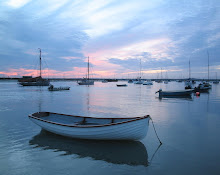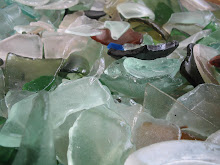
Well I'm a bit of a Tail-end Charlie in posting this review, because Daphne, by Justine Picardie, has already been blogged to bits and praised to the nth degree on every other blog in the land.
Like many people, when I read the advance publicity for this, I thought it all sounded tremendously interesting and full of promise. I rang my bookselling sister and asked her to pick me up a first edition straight away, and when I went down to Berkshire just after Easter and delightedly took delivery, I simply couldn't wait to begin.
The cover (designed by Sarah Morris) is simply superb - the woodcut-style illustration by Alison Lang, printed, if not actually letterpress, then in letterpress-effect, with shiny black ink on a dusty-red background, completely evokes the illustrations of the period. It's a beautiful looking book. Perhaps the best looking one I've seen this year.
Daphne is a famously well-researched novel. No stones were left unturned and the the author's own passion for the strands of her novel - Daphne du Maurier, the Brontes, stolen manuscripts, literary obsessions - forms another strand in itself. And here, for me, lay the stumbling block between me and this novel.
I enjoy multi-layered writing. I delight in literary mysteries. I have nothing against fictionalised biography per se, nor the merging of 'truths' and 'fictions', and I positively welcome books which send me off on all kinds of other literary tangents. But I found that this book - the synthesis of so much research and so much imaginative effort - failed, for me, precisely because it wears its research too heavily and assumes so little finesse or discernment on the part of the reader.
The plot has been endlessly recounted elsewhere, so I won't detail it here, but the intertwining central themes - Daphne du Maurier's life in crisis, her novel Rebecca, the lives of the Bronte's, the present-day characters - all echo one another on many levels. Echoes, echoes, echoes. Yet the pleasure of echoes is their subtlety, the way that, gently altering the original sound, they allow you to hear more. Sometimes they are so faint that it takes a finely tuned ear to hear them, and that is part of the enjoyment. Here, I'm afraid, I found the echoes simply too strident, too obvious, too clamourous. I felt I was being shouted at by the author. And my enjoyment in the book began to flag.
And then there is the book's contemporary 'heroine'. Oh dear. The characteristics of the naive, timid, nameless Second Mrs De Winter which, at the time when Rebecca is set were both plausible and (possibly) endearing are, in a 21st-century heroine, frankly implausible and deeply irritating and seems a hugely misconceived basis for the present-day strand of the book. The helpless, orphaned virgin, swept off her feet by an older academic who proceeds to live entirely in his thrall, in the home of his former wife, surrounded by not only her predecessor's furniture but also her personal possessions and books? Pur-leease, as my daughter would say.
The structural necessity of keeping all those echoes reverberating away means that there's simply not the slightest hope for the poor girl of any proper character development. She is doomed by the plot to be forever pathetic and rather stupid (PhD or no), blind as to the nature of her relationship with her (vile and charmless) husband - which in the contemporary world of Relate and the ubiquity of relationship advice and analysis in every magazine and newspaper again seems preposterous. My heart began to sink every time she reappeared - her sole function being to force the plot along by flinging at the reader a few more clunky reminders of the Rebecca connection.
I just could not buy into the modern-day strand, and I wondered whether this book was not only over-researched but under-edited, in the sense that a cool, restraining hand might not have gone amiss, in this and in other ways. I struggled to finish Daphne, which was a disappointing outcome given all the original excitement and promise. There's an elegant, slim novella in there somewhere, but it's got lost in an overblown novel that's trying to be big and 'important'.
Yes, the Daphne part of the story has inspired me to read Margaret Forster's biography, because it has reminded me what a fascinating woman du Maurier was and I'm keen to disentangle the biographical fact from this novel's fictions. And I've also dug out some of my yellowing paperback editions of du Maurier's short stories to re-read. (Plus, there was never any danger that I was going to stop reading about the Brontes, anyway, so no life-change there!) So in the sending-me-off-on-other-literary-tangents level, Daphne did work for this reader. On other levels, however, I'm afraid that we just didn't get on together at all.
Like many people, when I read the advance publicity for this, I thought it all sounded tremendously interesting and full of promise. I rang my bookselling sister and asked her to pick me up a first edition straight away, and when I went down to Berkshire just after Easter and delightedly took delivery, I simply couldn't wait to begin.
The cover (designed by Sarah Morris) is simply superb - the woodcut-style illustration by Alison Lang, printed, if not actually letterpress, then in letterpress-effect, with shiny black ink on a dusty-red background, completely evokes the illustrations of the period. It's a beautiful looking book. Perhaps the best looking one I've seen this year.
Daphne is a famously well-researched novel. No stones were left unturned and the the author's own passion for the strands of her novel - Daphne du Maurier, the Brontes, stolen manuscripts, literary obsessions - forms another strand in itself. And here, for me, lay the stumbling block between me and this novel.
I enjoy multi-layered writing. I delight in literary mysteries. I have nothing against fictionalised biography per se, nor the merging of 'truths' and 'fictions', and I positively welcome books which send me off on all kinds of other literary tangents. But I found that this book - the synthesis of so much research and so much imaginative effort - failed, for me, precisely because it wears its research too heavily and assumes so little finesse or discernment on the part of the reader.
The plot has been endlessly recounted elsewhere, so I won't detail it here, but the intertwining central themes - Daphne du Maurier's life in crisis, her novel Rebecca, the lives of the Bronte's, the present-day characters - all echo one another on many levels. Echoes, echoes, echoes. Yet the pleasure of echoes is their subtlety, the way that, gently altering the original sound, they allow you to hear more. Sometimes they are so faint that it takes a finely tuned ear to hear them, and that is part of the enjoyment. Here, I'm afraid, I found the echoes simply too strident, too obvious, too clamourous. I felt I was being shouted at by the author. And my enjoyment in the book began to flag.
And then there is the book's contemporary 'heroine'. Oh dear. The characteristics of the naive, timid, nameless Second Mrs De Winter which, at the time when Rebecca is set were both plausible and (possibly) endearing are, in a 21st-century heroine, frankly implausible and deeply irritating and seems a hugely misconceived basis for the present-day strand of the book. The helpless, orphaned virgin, swept off her feet by an older academic who proceeds to live entirely in his thrall, in the home of his former wife, surrounded by not only her predecessor's furniture but also her personal possessions and books? Pur-leease, as my daughter would say.
The structural necessity of keeping all those echoes reverberating away means that there's simply not the slightest hope for the poor girl of any proper character development. She is doomed by the plot to be forever pathetic and rather stupid (PhD or no), blind as to the nature of her relationship with her (vile and charmless) husband - which in the contemporary world of Relate and the ubiquity of relationship advice and analysis in every magazine and newspaper again seems preposterous. My heart began to sink every time she reappeared - her sole function being to force the plot along by flinging at the reader a few more clunky reminders of the Rebecca connection.
I just could not buy into the modern-day strand, and I wondered whether this book was not only over-researched but under-edited, in the sense that a cool, restraining hand might not have gone amiss, in this and in other ways. I struggled to finish Daphne, which was a disappointing outcome given all the original excitement and promise. There's an elegant, slim novella in there somewhere, but it's got lost in an overblown novel that's trying to be big and 'important'.
Yes, the Daphne part of the story has inspired me to read Margaret Forster's biography, because it has reminded me what a fascinating woman du Maurier was and I'm keen to disentangle the biographical fact from this novel's fictions. And I've also dug out some of my yellowing paperback editions of du Maurier's short stories to re-read. (Plus, there was never any danger that I was going to stop reading about the Brontes, anyway, so no life-change there!) So in the sending-me-off-on-other-literary-tangents level, Daphne did work for this reader. On other levels, however, I'm afraid that we just didn't get on together at all.





















9 comments:
I haven't read Daphne by Picardie but I have read Margaret Forster's biography. It's long and detailed but I thought it was worth it - it is well researched too, but I didn't feel as though I was being shouted at. It doesn't sound as if the Picardie book is for me, but if I see it in a bookshop or library I'll have a look. Thanks for an interesting review.
I'm with you on this J. I read the opening chapter of Daphne and that was enough to persuade me to go no further. So disappointing but, after all the hype - some of which verged on the hysterical - I can't say I was surprised.
Margaret Forster's biography is, however, in a completely different class, as you might expect from such an experienced, accomplished writer, who originally studied history. In the 1990s, It won the Fawcett Society's very first book prize - a sort of precursor to the Orange Prize. I was writing for and editing the society's magazine at the time, so went along to the very low-key reception where Margaret Forster received her award. She was delightful, modest and funny but, then, I think we all knew she would be. I was already an admirer of her writing and I still am.
This book has not appealed to me either, though I loved Du Maurier books and have enjoyed several by Justine P. I am quite interested in the Margaret Forster bio as I am a bit of a fan of hers, though I did read a bio of Daphne Du M years ago (I forget the author) and I feel as if "that's enough".
I know this is not directly on the point, but it is slightly relevant. My daughter read Rebecca at school and was recommended by her English teacher to read one of the sequels (not the Susan Hill one, I forget who the author is -- Sally Beauman maybe?). My daughter was very unimpressed, she said the character of Mrs De W had changed into implausibility, the style of the writing was just too different, etc.
I am not too keen on sequels to famous books written by other people - I remember a poor one attempting to follow on from Pride and Prejudice. I did not read the follow-up to Gone with the Wind, but I gather that was not considered much cop, either.
"There's an elegant, slim novella in there somewhere..."
Well said, but don't expect the publisher to come looking for blurbs from you.
BP - Daphne's had rave reviews on many other blogs, so don't let me put you off! Mine seems to be very much a minority view on the bogosphere, but it is a considered one, so I thought I'd post it anyway.
D (and BP) I'm really looking forward to reading the Margaret Forster biography. I do find du Maurier (and her extended family connection) fascinating, and Forster is certainly a consistently (thought unassumingly) first-rate writer. It is creeping ever closer to the top of the TBR mountain.
Maxine - Your daughter sounds like a very discerning reader for her age! Personally, I have a *real* problem with sequels. I read a truly awful and disturbing sequel to Wuthering Heights in my teens which put me right off the whole concept, because it was ages until I could 'get the taste of it out of my mouth', as it were, when re-reading the original. I did read Susan Hill's sequel to Rebecca, which I thought was pretty well done for what it was, but I have steered clear of any others. As I see it, Austen, the Brontes et al wrote precisely what they wanted to tell us, and their books are self-contained worlds. Their 'endings' are just that: The End. Speculating on 'what happened next' seems to me a wholly pointless and trivialising exercise (and a different thing altogether from eagerly awaiting with anticipation the next book in a series). If I want to get more out of Jane Austen or the Brontes, I re-read the originals rather than turning to someone else's flight of fancy. (In all this, I make an honourable exception of Jean Rhys's brilliant "Wide Sargasso Sea" - which is a prequel, anyway, so doesn't count!)
CPR - hi! - long time no see. Ahah, but when I'm being PAID, I can write scintillating blurbs for the very dullest of books. One of my jacket blurbs got its very own mention in The Observer some years ago, I'll have you know!!
This whole business of sequels written by other people has always struck me as literary parasitism, if not arrogance. What is the sequel writer saying? That the reader is incapable of using their own imagination - should they so wish - to extend an already perfectly conceived novel? That his or her writing skills are on a par with the original writer's? That the original text is somehow incomplete? (Tut tut, Jane Austen, Emily B et al - how lazy and thoughtless you were . . .)
There is only one answer to 'what happened next?' The answer is nothing. What you have just read is a novel and the confines of that novel or, say, a quartet of novels, are the first and last pages. How we interact as individual readers with a novel is another matter entirely.
I can see, however, that if you have a sufficiently high profile, there is some money to be made by pursuing the 'what happened next' route. We all have to put food on the table so, perhaps, it is simple case of pragmatism.
Many thanks, J, for providing the opportunity to rant about this subject.
D - hear hear - a rant after my own heart! Thanks to Maxine for raising the subject. I'm rather surprised that an English teacher should suggest the reading of sequels, frankly. Far better to encourage the reading of and comparison with other books by the same novelist, surely? Or books on a similar/contrasting theme by contemporaries of the writer in question? There are so many more rewarding academic avenues to explore in literature than the recent craze for sequels!
This all demands a big ranty post of its own. I shall put my mind to it while walking the dog!
Blimey, Juliet. That was comprehensive, interesting and frank... Um, speaking as a new e-friend, if you find my books not exactly to your taste, I must say I rather hope and beg that you don't review them!
Bravo, Juliet, for opening up this discussion. I, too, got sucked in by the hype on the book blogs and bought a copy of 'Daphne'. The cover is truly beautiful. And that is all I have been prepared to say to anyone who has asked my opinion. I have avoided expressing my disappointment publicly because all the heavy-weight reviewers in the blogosphere have been carried away by it. But it has all had an 'emperor's new clothes' feel about it to me, so it was good to read your honest review.
I really tried to read the book. I paid a lot of money for the hardback and I'm not one to give up easily but the lovely Bloomsbury ribbon simply refused to move beyond page 229. You have made all the critical points, both good and bad, that are to be made so I won't repeat them.
I find Daphne du Maurier more interesting as a person than a writer and Margaret Forster's biography is excellent. I enjoyed many of du Maurier's novels in my late teens but nowadays I put them out as undemanding reads for visitors. I certainly wouldn't call them great literature and I haven't understood the recent outpouring of reverential praise for all things Daphne.
I'm with you and your other commenters on the subject of sequels and prequels; I think D describes it perfectly as 'literary parasitism.'
Post a Comment